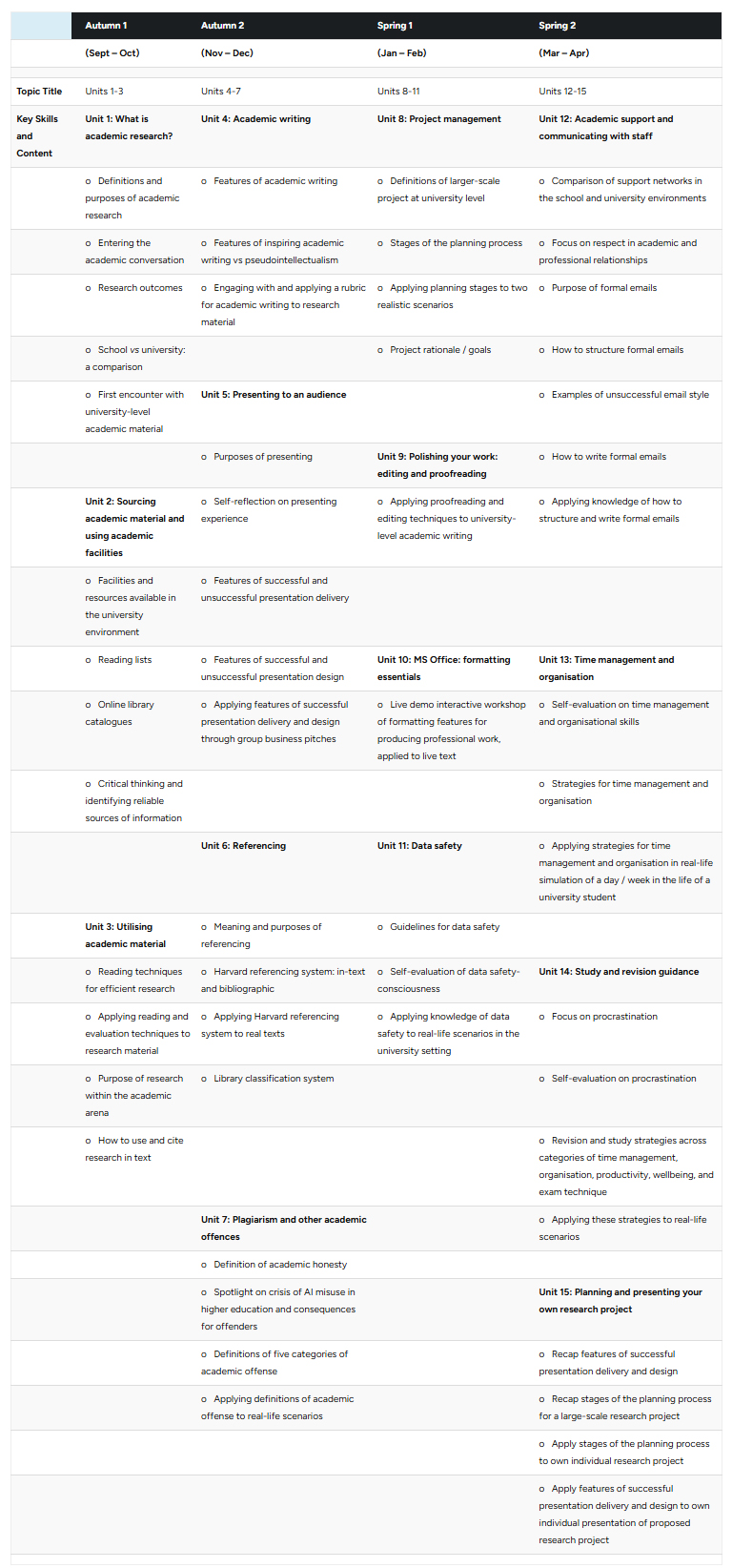| | (Sept – Oct) | (Nov – Dec) | (Jan – Feb) | (Mar – Apr) |
| | | | | |
| Topic Title | | Units 1-3 | Units 4-7 | Units 8-11 | Units 12-15 |
| Key Skills and Content | | Unit 1: What is academic research? | Unit 4: Academic writing | Unit 8: Project management | Unit 12: Academic support and communicating with staff |
| | o Definitions and purposes of academic research | o Features of academic writing | o Definitions of larger-scale project at university level | o Comparison of support networks in the school and university environments |
| | o Entering the academic conversation | o Features of inspiring academic writing vs pseudointellectualism | o Stages of the planning process | o Focus on respect in academic and professional relationships |
| | o Research outcomes | o Engaging with and applying a rubric for academic writing to research material | o Applying planning stages to two realistic scenarios | o Purpose of formal emails |
| | o School vs university: a comparison | | o Project rationale / goals | o How to structure formal emails |
| | o First encounter with university-level academic material | Unit 5: Presenting to an audience | | o Examples of unsuccessful email style |
| | | o Purposes of presenting | Unit 9: Polishing your work: editing and proofreading | o How to write formal emails |
| | Unit 2: Sourcing academic material and using academic facilities | o Self-reflection on presenting experience | o Applying proofreading and editing techniques to university-level academic writing | o Applying knowledge of how to structure and write formal emails |
| | o Facilities and resources available in the university environment | o Features of successful and unsuccessful presentation delivery | | |
| | o Reading lists | o Features of successful and unsuccessful presentation design | Unit 10: MS Office: formatting essentials | Unit 13: Time management and organisation |
| | o Online library catalogues | o Applying features of successful presentation delivery and design through group business pitches | o Live demo interactive workshop of formatting features for producing professional work, applied to live text | o Self-evaluation on time management and organisational skills |
| | o Critical thinking and identifying reliable sources of information | | | o Strategies for time management and organisation |
| | | Unit 6: Referencing | Unit 11: Data safety | o Applying strategies for time management and organisation in real-life simulation of a day / week in the life of a university student |
| | Unit 3: Utilising academic material | o Meaning and purposes of referencing | o Guidelines for data safety | |
| | o Reading techniques for efficient research | o Harvard referencing system: in-text and bibliographic | o Self-evaluation of data safety-consciousness | Unit 14: Study and revision guidance |
| | o Applying reading and evaluation techniques to research material | o Applying Harvard referencing system to real texts | o Applying knowledge of data safety to real-life scenarios in the university setting | o Focus on procrastination |
| | o Purpose of research within the academic arena | o Library classification system | | o Self-evaluation on procrastination |
| | o How to use and cite research in text | | | o Revision and study strategies across categories of time management, organisation, productivity, wellbeing, and exam technique |
| | | Unit 7: Plagiarism and other academic offences | | o Applying these strategies to real-life scenarios |
| | | o Definition of academic honesty | | |
| | | o Spotlight on crisis of AI misuse in higher education and consequences for offenders | | Unit 15: Planning and presenting your own research project |
| | | o Definitions of five categories of academic offense | | o Recap features of successful presentation delivery and design |
| | | o Applying definitions of academic offense to real-life scenarios | | o Recap stages of the planning process for a large-scale research project |
| | | | | o Apply stages of the planning process to own individual research project |
| | | | | o Apply features of successful presentation delivery and design to own individual presentation of proposed research project |
| | | | | |

